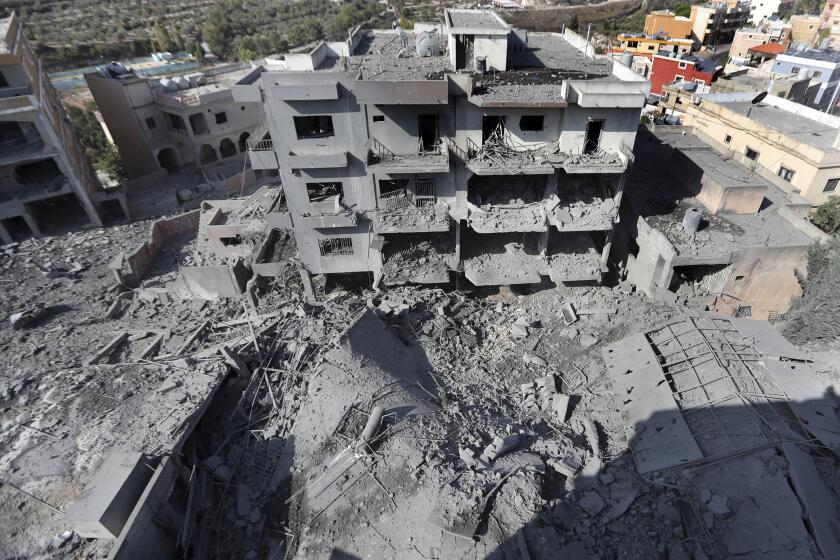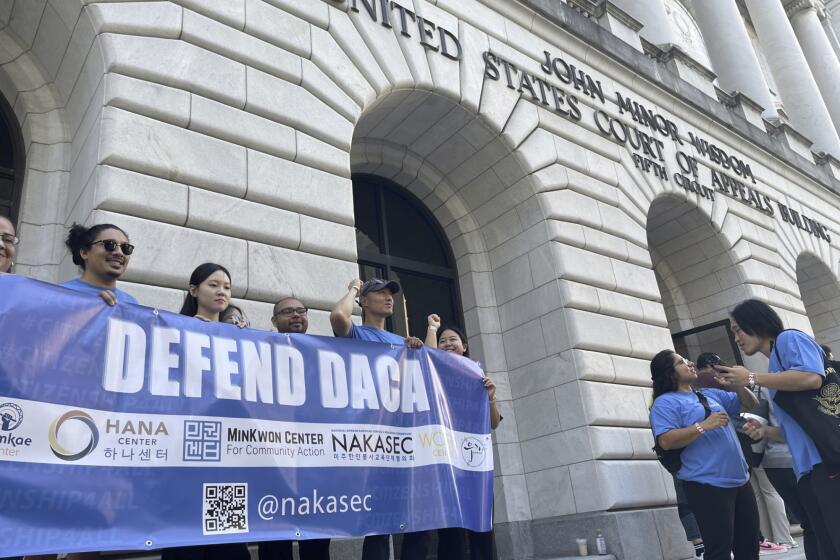Yeltsin Lashes Out at NATO Strikes in Bosnia
Russian President Boris N. Yeltsin defiantly stood by the Balkan Serbs on Friday, accusing NATO of “counting the trophies” of Serbian civilians killed in its bombing raids and warning that plans to expand the Western alliance could push all of Europe into war.
At his first solo news conference in more than a year, Yeltsin vowed to aid the Bosnian Serbs targeted in air strikes by the North Atlantic Treaty Organization, and he hinted that he will send weapons as well as more humanitarian help if attacks continue.
“These bombings are impermissible,” a robust and combative Yeltsin told hundreds of journalists summoned to the Kremlin for the rare exchange.
He accused the United States of backing Bosnia-Herzegovina’s Muslim-led government and Germany of supporting the Croats, leaving Russia little choice but to aid the Serbs, who share Russia’s Slavic heritage and the Orthodox Christian faith.
“We have historically had good contacts and relations with the Serbs. We have always supported each other,” Yeltsin told reporters. “Why should we leave them in the lurch today?”
Noting that Russian troops are stationed in Bosnian Serb-held territory as part of the U.N. peacekeeping mission in the Balkans, Yeltsin pointed to the NATO attacks as evidence that Russia has much to fear from Western plans to broaden the alliance to include former Soviet republics and former Communist countries in Eastern Europe.
“It would be a major political error on the part of those who are now insisting on expanding NATO,” Yeltsin warned. “It will mean a conflagration of war throughout all Europe.”
With its bombing raids aimed at forcing the Serbian rebels to the negotiating table, “NATO is already showing what it is capable of,” Yeltsin stated--”only of bombing, and then counting the trophies of how many are killed among the civilian population.”
The Bosnian Serbs have claimed that the NATO raids are killing civilians, but there has been no Western confirmation of such deaths.
Later Friday in Brussels, NATO Secretary General Willy Claes rejected Yeltsin’s criticisms. In Bosnia, he said, the alliance’s aircraft have been operating within limits set by the U.N. Security Council, a body where Russia has veto power.
“All our actions are based on [U.N. Resolution No.] 836,” he said.
Claes also left the impression that the alliance is prepared to risk a break in its fragile relations with Russia to pursue the goal of expansion.
“An eventual refusal from Moscow [to cooperate further with NATO] won’t stop a decision of the summit,” Claes said, referring to the January, 1994, NATO summit in Brussels that committed the alliance to the principle of offering membership to former Soviet republics and satellites.
A report detailing how enlargement might occur is due to be presented to NATO ambassadors for approval later this month. No formal discussion has yet taken place on when an expansion might occur and what countries might be involved, but the Czech Republic, Poland and Hungary are the three most frequently mentioned.
Although Yeltsin echoes Russia’s nationalist hard-liners in vowing to rescue the rebel Serbs, there is little popular support in Russia for an open confrontation with NATO and even less for involvement in a war in behalf of a vague notion of Slavic solidarity. But with Russia in the midst of a parliamentary election season, NATO’s efforts to break the Serbian siege of Sarajevo have whipped up a fury of political grandstanding on the issue.
The recessed Duma, Russia’s lower house of Parliament, has called an emergency session for today to discuss the Balkan crisis and proposals to break U.N.-imposed sanctions against the rump Yugoslavia.
Yeltsin planned a meeting later today with Prime Minister Viktor S. Chernomyrdin to discuss the Russian-NATO disagreement before heading off Sunday for a two-week vacation in the Black Sea resort of Sochi.
Even during his emphatic pronouncements on the Balkan conflict, Yeltsin appeared healthier and more in command of himself than he has in months. Unlike the public appearances earlier this year, at which he appeared drugged or under the influence of alcohol, he bantered jovially with reporters and needled his press secretary, Sergei K. Medvedev, for not calling on enough foreigners and women.
Yeltsin suffered a mild heart attack July 11 and spent a month recovering at a Moscow hospital and a suburban spa.
His wide-ranging, 90-minute exchange with journalists was remarkable for its cursory acknowledgment of Russia’s own war--the simmering conflict in the southern republic of Chechnya, where the Kremlin sent troops, warplanes and artillery in December to crush an independence rebellion.
Times staff writer Tyler Marshall in Brussels contributed to this report.
More to Read
Sign up for Essential California
The most important California stories and recommendations in your inbox every morning.
You may occasionally receive promotional content from the Los Angeles Times.











